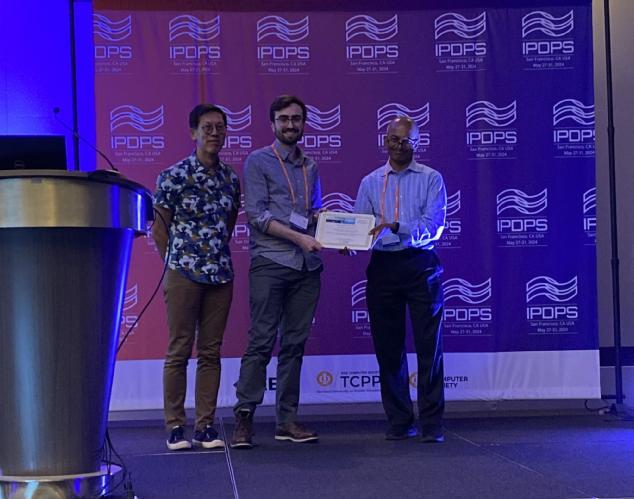Computer Science News
Breakthrough result on the power of memory in computation
A recent paperLink opens in a new window published by Dr. Ian MertzLink opens in a new window, a postdoctoral researcher in the Theory and Foundations (FoCS)Link opens in a new window research group and the Centre for Discrete Mathematics and its Applications (DIMAP)Link opens in a new window, has disproved a longstanding conjecture on the limitations of space-bounded computation.
For many years it had been believed that a function, known as Tree Evaluation, would be the key to separating two fundamental classes of problems: those computable quickly (P), and those computable in low space (L). Mertz, along with James CookLink opens in a new window of Toronto, builds on their earlier work to show a low-space algorithm for Tree Evaluation, thus refuting this belief. In particular, their technique has attracted attention for shedding new light on the power of space-bounded computation, suggesting novel approaches to age-old questions in complexity theory. They show that space can be used in surprising ways, with the same memory serving many simultaneous purposes.
The paper, which Mertz will present at the 56th Annual ACM Symposium on the Theory of Computing (STOC 2024)Link opens in a new window, has been invited to the special issue of SIAM Journal on Computing (SICOMP)Link opens in a new window for the conference. STOC is the main conference of the Association of Computing Machinery (ACM) and one of the two premier venues for theoretical computer science, with only the top results being invited for publication in the special issue.
Mertz has also presented this work at many venues, including the Institute for Advanced Study (IAS), Columbia University, Oxford University, Warwick (Online Complexity Seminar)Link opens in a new window, McGill University, and others.
SIGMOD 2024 Test of Time Award for ‘PrivBayes’
The work of Professor Graham Cormode has been recognized with a “test of time” award. The ACM SIGMOD conference presents an award each year for the paper from SIGMOD 10-12 years previously that has had the biggest impact, and passed the “test-of-time”. The 2014 paper “PrivBayes: private data release via bayesian networks” (Jun Zhang, Graham Cormode, Cecilia M. Procopiuc, Divesh Srivastava, Xiaokui Xiao) was selected for this honour. The award will be presented at the 2024 ACM SIGMOD Conference in Santiago.
Best Paper Award at IPDPS 2024

Toby Flynn, PhD student in the department's High-Performance and Scientific Computing group, supervised by Prof. Gihan Mudalige together with Dr. Robert Manson-Sawko at IBM Research UK received the best paper award at the 38th IEEE International Parallel and Distributed Processing Symposium (IPDPS 2024) last week in San Francisco US. IPDPS is one of the most prominent and high ranking conferences in parallel and distributed computing, now in its 38th year.
The paper titled "Performance-Portable Multiphase Flow Solutions with Discontinuous Galerkin Methods", details the development of a new performance portable solver workflow using Discontinuous Galerkin (DG) methods for developing multiphase flow simulations based on the OP2 domain-specific language. Results demonstrate scaling on both CPU and GPU systems including UK's national supercomputer, ARCHER2 at EPCC Edinburgh and the European Petascale Supercomputer, LUMI hosted by CSC Finland. The work is a collaboration with IBM Research UK supported by an iCASE award funded jointly by IBM and EPSRC.
The paper pre-print is available here.
Best Thesis Prize awarded for the TIA Centre for the Fifth Time
The Tissue Image Analytics (TIA) Centre is delighted to extend its congratulations to Dang Vu for winning the 2024 Best Thesis Prize for the Department of Computer Science. Dang is a former PhD student from the TIA Centre and his thesis was entitled “Handcrafted Representations for Whole Slide Images”.
On winning his award Dang has said “Winning this award is a great honour and a wonderful acknowledgment of my research. I'm grateful for the support and guidance I've received from my advisors and colleagues throughout this journey. This recognition inspires me to continue working hard and contributing to the field of computer science and medical research”.
The award for Dang comes on the back of former students from the TIA Centre winning 4 previous Best Science Faculty Thesis awards in previous years :-
2015 - Adnan Khan
2017 - Korsuk Sirinukunwattana
2019 - Talha Qaiser
2021 - Simon Graham
Seven papers accepted to ICML 2024
Seven papers authored by Computer Science researchers from Warwick have been accepted for publication at the 41st International Conference on Machine Learning, one of the top three global venues for machine learning research, which will be held on 21-27 July 2024 in Vienna, Austria:
- Agent-Specific Effects: A Causal Effect Propagation Analysis in Multi-Agent MDPs, by Stelios Triantafyllou, Aleksa Sukovic, Debmalya Mandal, and Goran Radanovic
- Dynamic Facility Location in High Dimensional Euclidean Spaces, by Sayan Bhattacharya, Gramoz Goranci, Shaofeng Jiang, Yi Qian, and Yubo Zhang (Accepted as a spotlight, among the top 13 percent of all accepted papers)
- High-Dimensional Kernel Methods under Covariate Shift: Data-Dependent Implicit Regularization, by Yihang Chen, Fanghui Liu, Taiji Suzuki, and Volkan Cevher
- Revisiting character-level adversarial attacks, by Elias Abad Rocamora, Yongtao Wu, Fanghui Liu, Grigorios Chrysos, and Volkan Cevher
- Reward Model Learning vs. Direct Policy Optimization: A Comparative Analysis of Learning from Human Preferences, by Andi Nika, Debmalya Mandal, Parameswaran Kamalaruban, Georgios Tzannetos, Goran Radanovic, and Adish Singla
- To Each (Textual Sequence) Its Own: Improving Memorized-Data Unlearning in Large Language Models, by George-Octavian Bărbulescu and Peter Triantafillou
- Towards Neural Architecture Search through Hierarchical Generative Modeling, by Lichuan Xiang, Łukasz Dudziak, Mohamed Abdelfattah, Abhinav Mehrotra, Nicholas Lane, and Hongkai Wen
New Computer Science programme with the Kharkiv National University of Radio Electronics (NURE)
The University of Warwick will launch a new Computer Science programme with the Kharkiv National University of Radio Electronics (NURE) this September. This announcement coincides with the second anniversary of the University of Warwick's official twinning with NURE (29 Mar). The full story is available hereLink opens in a new window.
